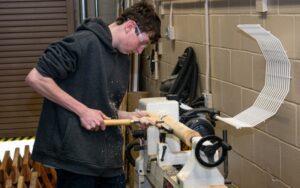
County vocational-technical schools prepare students for both college and career pathways after high school.
As National College Decision Day approaches, the rising cost of college has led to an increased focus on alternate pathways for students. This has long been a goal of the New Jersey Council of County Vocational-Technical Schools (NJCCVTS): promote the value of a career-focused education.
Although much of the national conversation weighs college versus technical training, the NJCCVTS encourages all students to consider a career-focused high school education, regardless of post-secondary plans.
Students directly entering the workforce are not the only ones avoiding college debt. New Jersey’s county vocational-technical schools have strong articulation and dual enrollment agreements with college and university partners, which enable many students to earn college credits while still in high school at little or no cost to families.
When these students go on to college, they also benefit from having spent significant time learning within their field of interest. This helps them enter college with clearer goals and stay on track to graduate on time, if not early, when transferring credits.
Aubrianna Borger, a 2017 graduate of the Allied Medical program at Cape May County Technical Schools, said she had confidence both in her career choice to become a pharmacist and her ability to succeed because of the start she got at Cape May County Technical School.
“The Allied Medical program at Cape May County Technical High School opens students up to considering all of the different possible professions within medicine and provides them with a strong baseline medical education that is important no matter which profession they pursue,” she said. “My knowledge from the Dynamics in Healthcare, Medical Terminology and Anatomy and Physiology courses helped me tremendously during my pharmacy school education – in fact I still have my Medical Terminology book to this day!”
Within the most recent graduating class, the Class of 2023, 250 county vocational-technical high school graduates obtained an associate degree before receiving their high school diploma. This is the equivalent of two full years of college.
A head start on college is just one way New Jersey’s vocational-technical school model helps students focus on their futures to save time – and money – in the long run. Each career program involves hands-on education in customized classroom spaces, taught by teachers with industry experience. Many students also have opportunities to earn industry-valued credentials and participate in work-based learning experiences, often getting paid on the job while enrolled in high school.
Kim Harvey, a 2023 graduate from Cumberland County Technical Education Center (CCTEC), took full advantage of the opportunities presented by her high school. She not only found her passion in welding but worked toward transitioning right into a welding career after graduation.
She graduated with important certifications from the American Welding Society like AWS D1.1, a structural welding code; and AWS sense level 1, for entry-level welders. She also obtained OSHA 10 certification.
Today, Harvey is a set-up employee and operator with JD Machine Parts in Rosenhayn. She initially joined the company prior to her senior year at CCTEC to gain real-world experience. Already established there, Harvey continued working at JD Machine Parts throughout her senior year as part of CCTEC’s work-based learning program.
Harvey’s story is an example of how work-based learning can serve as a transformative experience for vocational-technical school students. Participants gain both technical and professional skills through these work experiences and often make important connections with employers to get a foot in the door.
In some cases, employers will even pay students to attend college while they are working. Others may offer an apprenticeship, during which students continue learning after high school while also earning a paycheck and moving toward a jump in pay.

County vocational-technical schools across New Jersey engage students in hands-on learning in customized classroom spaces equipped with the same tools and technology used in industry.
The Carpenters Career Connections program, for example, offers a free, four-year apprenticeship, after which participants earn $100,000 a year. In addition to work-based learning, skills-based competitions help students connect what they are learning in high school to the real world. This boosts student engagement and success. Proof of that is the impressive 99% graduation rate for New Jersey county vocational-technical schools – a figure well above the statewide average of 91%.
Such experiences also emphasize professional skill development. Students build teamwork, critical thinking and leadership skills. They understand how to take accountability to perform important roles as part of a team.
Employers seek hires with such broad skill sets. Each of the state’s 21 county vocational-technical schools builds partnerships with employers to support career programs. In turn, employers connect with and help train a new generation to enter their industry.
Employer partnerships also are critically important to the vocational-technical school model. Partners help schools evaluate curriculum to ensure it is up-to-date and provides students with relevant training. They may offer internships, apprenticeships and other work-based learning opportunities. And they may serve as guest speakers or host an onsite visit.
The involvement of professionals further helps students prepare for a seamless transition into the next phase of their career journey, whether their first stop is college, post-graduate training or the workplace.
Conversation Starter
Visit careertechnj.org/about-our-schools/ to access the recently released NJCCVTS Fact Sheet. Visit https://careertechnj.org/videos/ for a video library to further explore the value of a county vocational-technical school education.
Read this article as it originally appeared April 29, 2024 in ROI-NJ.



